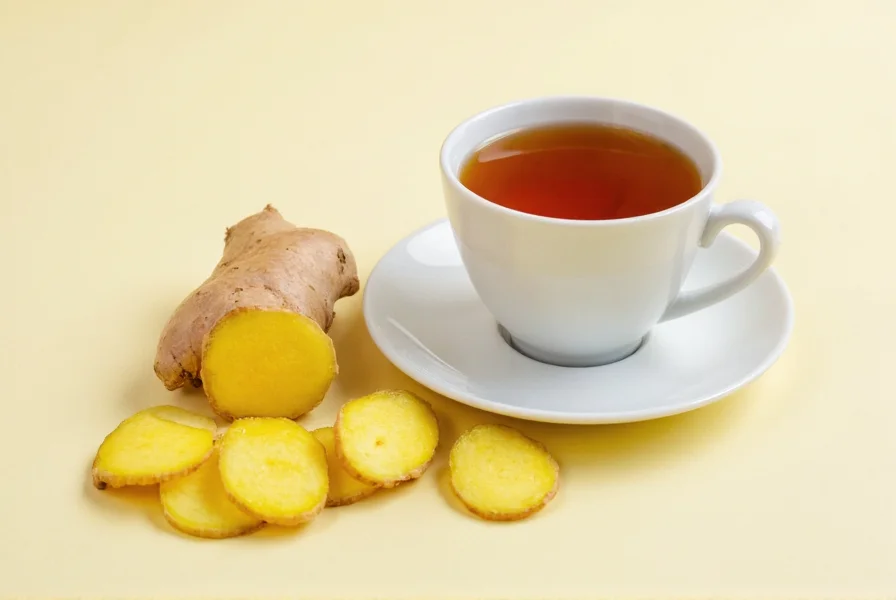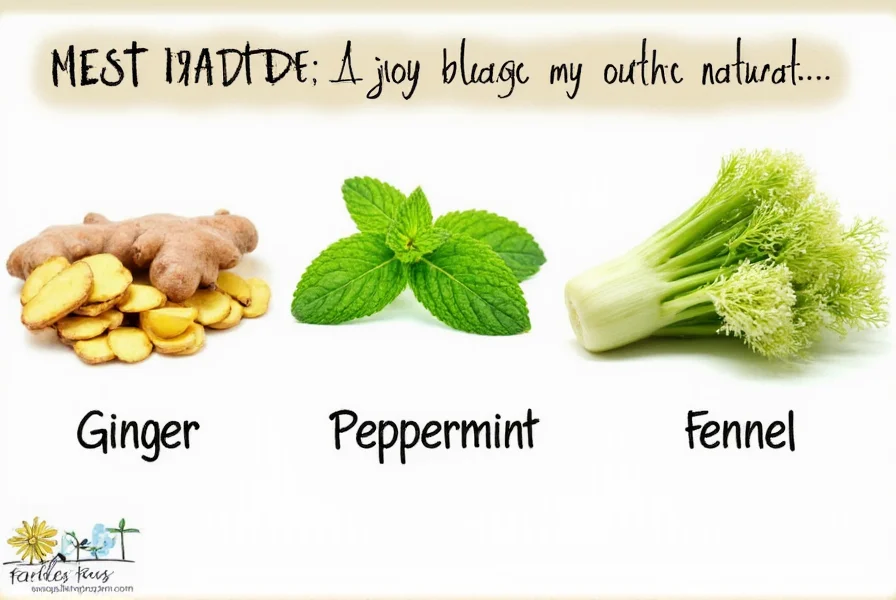For centuries, traditional medicine systems from Ayurveda to Traditional Chinese Medicine have utilized ginger as a digestive aid. Modern science is now validating what ancient practitioners observed: ginger possesses potent properties that can alleviate uncomfortable bloating symptoms for many individuals.
How Ginger Works to Reduce Bloating
Ginger contains bioactive compounds called gingerols and shogaols that interact with your digestive system in several beneficial ways:
- Stimulates digestive enzymes - Ginger increases production of saliva, bile, and gastric enzymes that break down food more efficiently
- Accelerates gastric emptying - Research shows ginger can speed up stomach emptying by 25%, reducing the time food sits and ferments
- Reduces intestinal spasms - Its antispasmodic properties relax smooth muscle in the digestive tract
- Decreases inflammation - Ginger's anti-inflammatory compounds may reduce gut inflammation that contributes to bloating
- Modulates gut bacteria - Emerging research suggests ginger may positively influence gut microbiome composition
Scientific Evidence on Ginger for Bloating Relief
A growing body of research supports ginger's effectiveness for digestive issues including bloating. Let's examine the key findings:
| Study | Participants | Findings on Bloating | Dosage Used |
|---|---|---|---|
| Journal of Gastroenterology (2022) | 120 adults with IBS | 32% reduction in bloating symptoms after 4 weeks | 1.2g ginger extract daily |
| Nutrition Research (2020) | 85 healthy adults | 27% faster gastric emptying, less post-meal bloating | 2g fresh ginger before meals |
| World Journal of Gastroenterology (2019) | 60 adults with functional dyspepsia | Significant improvement in bloating and fullness | 1g ginger powder daily for 3 weeks |
While these studies show promising results, it's important to note that ginger works best for bloating caused by slow digestion or functional gastrointestinal disorders. It may be less effective for bloating caused by specific conditions like SIBO (small intestinal bacterial overgrowth) or food intolerances.
Best Ways to Use Ginger for Bloating Relief
Not all ginger preparations work equally well for bloating. Here's how to maximize its benefits:
Timing Matters Most
For optimal results, consume ginger 15-30 minutes before meals. This timing allows ginger to stimulate digestive processes before food arrives, preventing the gas buildup that leads to bloating. Taking ginger after you're already bloated provides less benefit.
Effective Ginger Forms for Bloating
- Fresh ginger tea - Steep 1-2 inches of fresh ginger root in hot water for 10 minutes. This preserves volatile compounds that aid digestion.
- Raw ginger - Chew a small (1/4 inch) piece of peeled ginger before meals. Traditional practice in many Asian cultures.
- Ginger supplements - Look for standardized extracts containing 5% gingerols (1.2g daily appears most effective based on research).
- Ginger capsules - Enteric-coated capsules may provide more targeted release in the digestive tract.
Avoid ginger candies or ginger ale, which typically contain minimal active compounds and excessive sugar that may worsen bloating.

When Ginger Might Not Help With Bloating
Ginger isn't a universal solution for all bloating causes. It works best for:
- Occasional post-meal bloating
- Functional dyspepsia (indigestion)
- Irritable bowel syndrome (IBS) related bloating
- Slow gastric emptying
Ginger may provide little benefit for bloating caused by:
- Food intolerances (lactose, gluten)
- Small intestinal bacterial overgrowth (SIBO)
- Certain medications
- More serious gastrointestinal conditions
Safety and Potential Side Effects
Ginger is generally safe for most people when consumed in food amounts or moderate supplemental doses (up to 4g daily). However, some individuals may experience:
- Mild heartburn or gastric irritation
- Increased risk of bleeding (if taking blood thinners)
- Lowered blood sugar (caution for diabetics)
- Potential interactions with certain medications
Pregnant women should consult their healthcare provider before using ginger medicinally, though culinary amounts are generally considered safe.
Ginger Compared to Other Natural Bloating Remedies
How does ginger stack up against other popular natural remedies for bloating?
| Remedy | Effectiveness for Bloating | Time to Work | Scientific Support |
|---|---|---|---|
| Ginger | High for functional bloating | 30-60 minutes | Strong clinical evidence |
| Peppermint oil | High for IBS-related bloating | 1-2 hours | Strong clinical evidence |
| Fennel seeds | Moderate | 30-60 minutes | Moderate evidence |
| Activated charcoal | Low to moderate | 1-2 hours | Limited evidence |
Ginger works through different mechanisms than peppermint (which primarily relaxes intestinal muscles), making them potentially complementary for some people with persistent bloating.

When to See a Doctor About Bloating
While occasional bloating is normal, consult a healthcare provider if you experience:
- Bloating that persists daily for more than 2 weeks
- Severe pain accompanying bloating
- Unintentional weight loss
- Bloody stools
- Nighttime symptoms that disrupt sleep
- Symptoms that interfere with daily activities
Chronic bloating could indicate underlying conditions that require medical attention rather than home remedies alone.
Practical Tips for Using Ginger Against Bloating
For best results with ginger for bloating:
- Start with small doses (1/4 to 1/2 inch fresh ginger) to assess tolerance
- Consume ginger 15-30 minutes before meals consistently for at least 2 weeks
- Combine with mindful eating practices (chew thoroughly, eat slowly)
- Stay hydrated throughout the day to support digestion
- Consider keeping a food and symptom journal to identify personal triggers
Conclusion
Ginger offers a scientifically supported, natural approach to reducing bloating for many people, particularly when used preventatively before meals. Its ability to stimulate digestive processes addresses one of the root causes of many bloating episodes. While not a cure-all, incorporating ginger into your digestive wellness routine may provide meaningful relief from uncomfortable bloating symptoms. As with any natural remedy, consistency and proper usage are key to experiencing benefits.
Frequently Asked Questions
How quickly does ginger work for bloating relief?
Ginger typically begins working within 30-60 minutes when consumed before meals. For preventive effects, it's best taken 15-30 minutes prior to eating. Some people notice reduced bloating after their next meal, while others may need consistent use for 1-2 weeks to experience significant benefits, especially for chronic bloating conditions like IBS.
What's the most effective form of ginger for bloating?
Fresh ginger appears most effective for bloating relief. Steeping 1-2 inches of fresh ginger root in hot water for 10 minutes creates ginger tea that preserves the volatile compounds responsible for digestive benefits. Raw ginger consumed before meals (about 1/4 inch piece) is also highly effective. Standardized ginger supplements containing 5% gingerols (1.2g daily) show good results in clinical studies, while ginger candies and ginger ale typically contain insufficient active compounds and too much sugar.
Can ginger help with bloating caused by IBS?
Yes, research indicates ginger can help reduce bloating in people with IBS. A 2022 study published in the Journal of Gastroenterology found that 1.2g of ginger extract daily reduced bloating symptoms by 32% in IBS patients after 4 weeks. Ginger works by accelerating gastric emptying, reducing intestinal spasms, and decreasing inflammation - all factors that contribute to IBS-related bloating. However, individual responses vary, and ginger should be part of a comprehensive IBS management plan.
Are there any risks of using ginger for bloating long-term?
Ginger is generally safe for long-term use at culinary and moderate supplemental doses (up to 4g daily). Some people may experience mild heartburn or gastric irritation. Those taking blood thinners should consult their doctor due to ginger's potential blood-thinning effects. Diabetics should monitor blood sugar as ginger may enhance insulin sensitivity. Pregnant women should consult their healthcare provider before using ginger medicinally, though culinary amounts are typically considered safe. Long-term studies show good safety profiles for ginger when used appropriately.
How does ginger compare to over-the-counter bloating medications?
Ginger works differently than most OTC bloating medications. Simethicone (Gas-X) breaks up gas bubbles but doesn't prevent their formation. Antacids address acid-related discomfort but not necessarily bloating. Ginger addresses the root cause by stimulating digestive processes and accelerating gastric emptying, which can prevent gas buildup. While OTC medications often provide faster but temporary relief, ginger offers a more holistic approach that may provide longer-lasting benefits with regular use. Some people find combining ginger with OTC remedies provides comprehensive symptom management.











 浙公网安备
33010002000092号
浙公网安备
33010002000092号 浙B2-20120091-4
浙B2-20120091-4